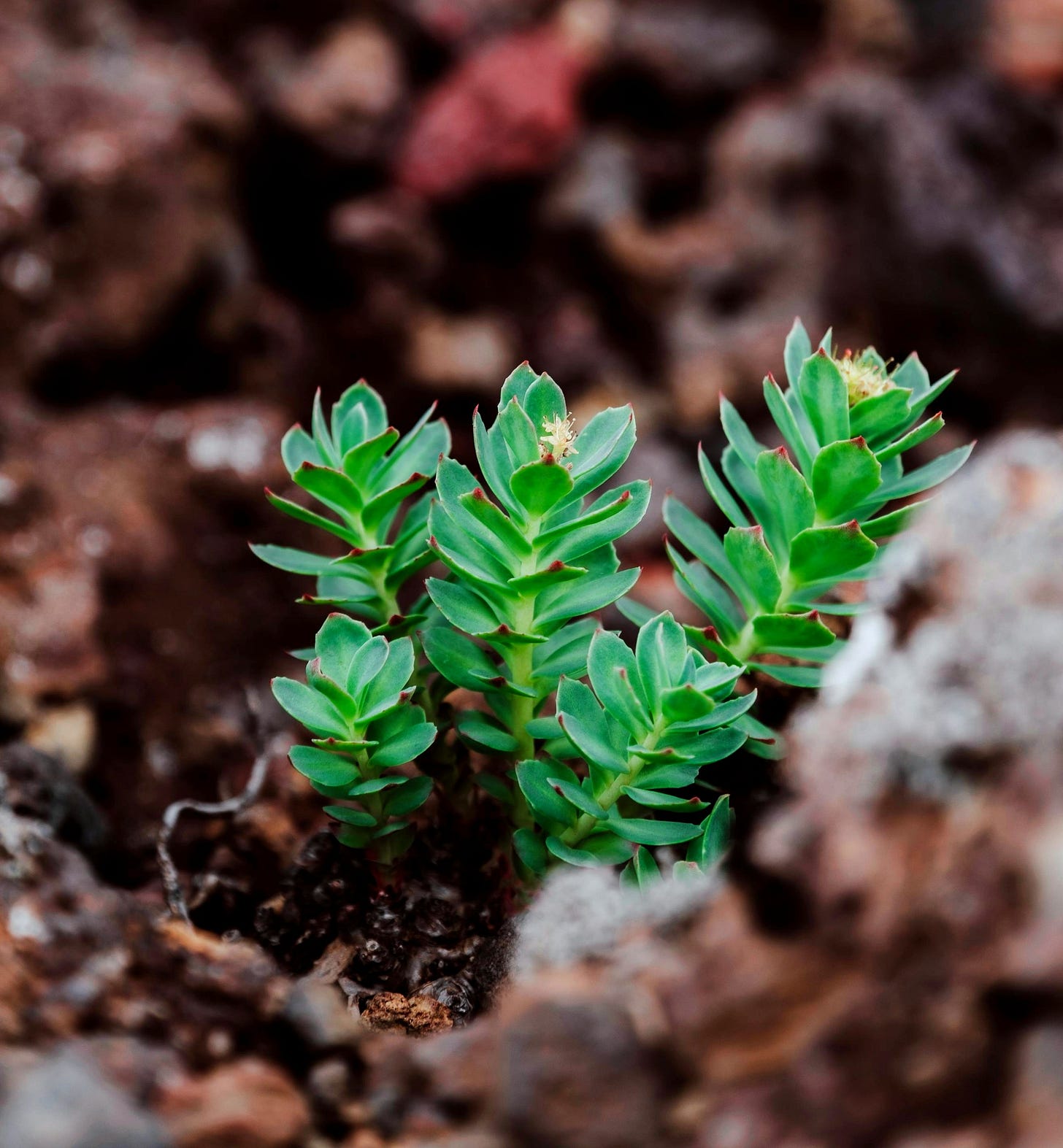In the vast and often overlooked world of natural remedies, a golden treasure awaits discovery: Rhodiola rosea, the "golden root" of the Arctic. While scientists are increasingly intrigued by its potential, this resilient herb remains relatively unknown to many. Thriving in the unforgiving landscapes of the Arctic and high altitudes, Rhodiola has been a trusted ally in traditional medicine for centuries, quietly offering a wealth of benefits. Prepare to embark on a journey into the fascinating world of this extraordinary plant, where we'll blend scientific exploration with a touch of wit to unravel the charm and potential of Rhodiola's wonders.

The Plant: A Hardy Beauty
Rhodiola rosea, also known as Arctic root, golden root, or rosy root, is a succulent perennial belonging to the Crassulaceae family (the same clan as jade plants). Think plump, fleshy leaves and vibrant yellow flowers, a far cry from your typical wilting office plant. And yes, you can grow this little powerhouse in a pot or garden – more on that later.
Beneficial Components: The Science Behind the Magic
Rhodiola rosea is an orchestra of beneficial compounds, working in harmonious synergy to promote well-being. Its potent cocktail includes:
Rosavins: These are the stars of the show, responsible for much of Rhodiola's adaptogenic prowess (more on that in a bit).
Salidrosides: Potent antioxidants, shielding your cells from oxidative damage.
Tyrosol: Supporting mental clarity and mood, it's like a cup of coffee without the jitters.
Phenols and Flavonoids: Boosting immunity and heart health, they’re the plant’s protective powerhouses.
Adaptogens: What's the Big Deal?
Rhodiola is classified as an adaptogen, meaning it helps your body cope with stress – not by masking symptoms, but by enhancing your body's natural resilience.
Parts Utilized: Rooting for the Root
The root is Rhodiola’s crowning glory, traditionally used in teas, tinctures, and capsules. However, the entire plant can be used, offering a holistic approach to wellness. Whether brewed or encapsulated, each part contributes to its therapeutic profile.
Historical Roots: Ancient Wisdom
Rhodiola’s history is as rich as its benefits. Siberians chewed its roots for vitality, while Vikings sought it for battle stamina. In Chinese medicine, it’s known as "Hong Ling," treasured for balancing energies. This ancient herb has stood the test of time, proving its mettle across cultures.
Health Benefits: A Modern World Comprehensive Guide
Stress Less, Live More: Rhodiola improves mood and reduces anxiety: Say goodbye to the afternoon slump and hello to a more balanced temperament. By aiding your adrenal glands, it just helps you handle life’s ups and downs with ease.
Mind Matters: Sharpen your focus and brighten your mood. Rhodiola is your brain’s best friend, whether you’re cramming for exams or needing a creative boost.

Physical Edge: Unlock your inner athlete. Rhodiola enhances stamina and recovery, making it a favorite among fitness enthusiasts.
Energy Booster: One of the most sought-after benefits of Rhodiola is its ability to increase energy levels and combat chronic fatigue.
Sleep Serenade: Struggling with sleep? Rhodiola regulates your circadian rhythms, ensuring restful nights and vibrant mornings.
Heart Health: This herb is your heart’s ally, improving blood flow and keeping your cardiovascular system in top shape.
Glowing Skin: Say goodbye to stress-induced breakouts. Rhodiola’s antioxidants keep your skin radiant and youthful.
Immunity Best Friend: Rhodiola is your immune system’s sidekick, fighting off pathogens and keeping you healthy year-round.
Cancer Fighter: While the mechanism is not yet fully understood, multiple studies suggest the plant holds promising potential as anti-cancer treatment.
Covid Vaccine Fix: Rhodiola must be a part of the recovery regimen for those who received the Covid vaccine.
Grow Your Own Rhodiola Powerhouse:
Ready to cultivate your own personal supply of stress-fighting goodness? Rhodiola thrives in well-drained soil, plenty of sunlight (but not scorching midday sun), and cool temperatures. It prefers slightly acidic to neutral soil pH levels. Containers are perfectly acceptable, so even urban dwellers can join the Rhodiola revolution. Just make sure to provide good drainage to avoid root rot.
Important Considerations:
While Rhodiola is generally considered safe, caution is advised. If you are taking other medications or have pre-existing health conditions, always check for potential drug interactions.
Remember that adaptogens like Rhodiola require consistency for best results; don't expect overnight miracles.
If buying it as a supplement, be aware that quality differs – some products may have fillers or low active ingredients. See my article for more on choosing quality supplements.
Conclusion: Embrace Rhodiola’s Radiance
From its resilient nature to its impressive health profile, Rhodiola is a true gem. Whether you’re gardening, sipping its tea, or taking it as a supplement, this Arctic root offers a natural path to vitality. Let Rhodiola be your partner in wellness, helping you shine with renewed energy and joy. Give it a try—it might just become your new daily ritual!
References
Adaptogens With a Special Emphasis on Withania somnifera and Rhodiola rosea - ScienceDirect
🌟 After five years of sharing my work for free, I now really need your support to continue. Help sustain my efforts through paid subscriptions, donations, or collaborations.
How To Support my work 👇
➡️ Become a paid subscriber or a founding member
➡️ Donate through my website https://genuineprospect.com
by PayPal or direct transfer (don't worry, your information remains with you).
➡️ Collaborate: Need a biomedical science writer or some assistance? Contact me via genuineprospect@proton.me or here.
Read my story here ⬇️
Sharing My Journey and What Comes Next
Join me in creating lasting change together! 💪




